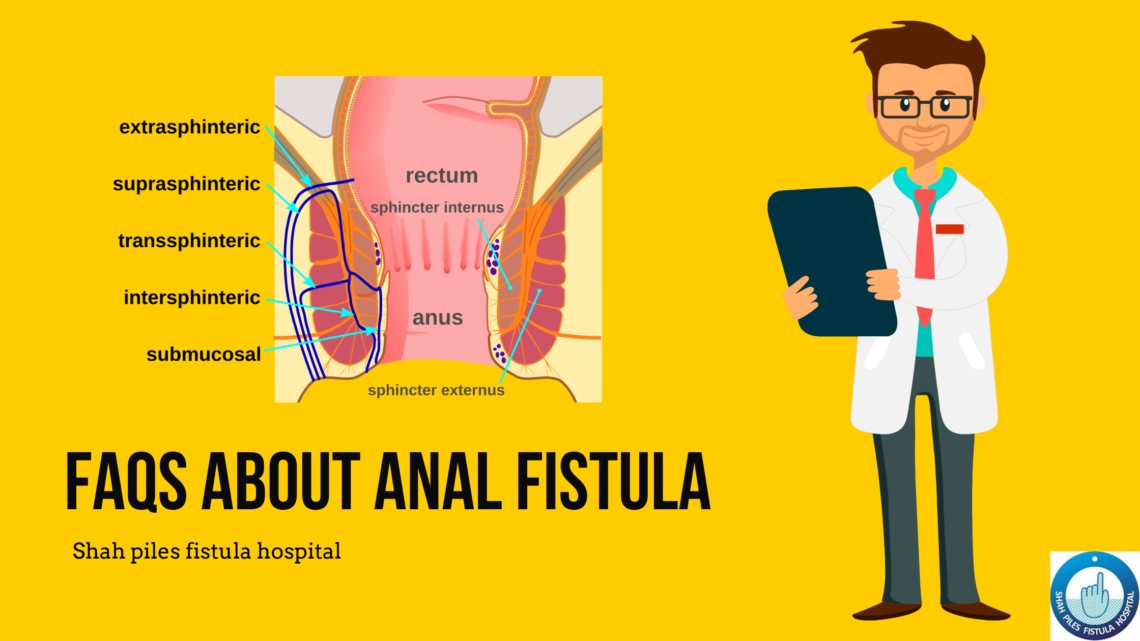
There are many questions raises in the mind about Fistula, specially when someone has minor or major anal problem, they literally have many doubts that from what I’m going through? Is it fistula? What are causes? and Why it happens?
So here are the answers of the most frequently asked questions about Fistula. Hope you clear your every doubt about Fistula till the end of the blog.
- What is Fistula?
- An anal fistula is a medical term for an infected tunnel that develops between the skin and the muscular opening at the end of the digestive tract (anus).
- Most anal fistulas are the result of an infection that starts in an anal gland. Abscess can be the result of this infection which continuously drain or in some cases it surgically drained passes through the skin around anus. A tunnel under the skin around anus has been formed by Fistula and that connects to the infected gland.
- How many types of Fistula are there?
There are mainly five types of Fistula are there:
- Extrasphincteric fistulae
- Suprasphincteric fistulae
- Transphincteric fistulae
- Intersphincteric fistulae
- Submucosal fistulae
- What are the causes of Fistula?
- Just inside your anus are several glands that make fluid. Sometimes, they get blocked or clogged. When that happens, a bacteria build-up can create a swollen pocket of infected tissue and liquid. Doctors call this an abscess.
- If you don’t treat the abscess, it’ll grow. Eventually, it’ll make its way to the outside and punch a hole in the skin somewhere near your anus so the gunk inside it can drain. The fistula is the tunnel that connects the gland to that opening.
- Most of the time, an abscess causes a fistula. It’s rare, but they can also come from conditions like tuberculosis, sexually transmitted diseases, or an ongoing illness that affects your bowels.
- What are the Symptoms of Fistula?
- Skin maceration
- Pus, Serous fluid and/or (rarely) feces discharge — can be bloody or purulent
- Pruritis Ani— Itching
- Depending on the presence and severity of infection:
- Pain
- Swelling
- Tenderness
- Fever
- Unpleasant odour
- Thick discharge, which keeps the area wet
- What are the Risk Factors of Anal Fistula?
Negligence of any anal related symptoms, like burning, bleeding, itching further may develop an infection into anal glands and can lead to abscess formation which in turn leads to fistulae.
- Can Fistula cause Cancer?
In very rare case Fistula can cause cancer specially if it is left untreated for longer period of time. Better to treat as soon as possible to save yourself from a very serious cancer.
- Are there any chances to heal Fistula by itself?
No there is not a chance to heal itself. In some cases, it may heal by itself for once but later it can reform fistula. So, it’s not a permanent solution, you need to go for medication or surgery.
- Is Fistula Treatable?
Yes, it is treatable if the treatment is done by Best Piles Hospital Ahmedabad. The Piles hospital in Ahmedabad has treated more than 1.5 lac patients over the years suffering from a spectrum of diseases which include Piles (Masa\Babasir), Fissure (Wadhiya), Fistula (Bhagandar), Pilonidal sinus, Rectal polyp and all other problems related to the anal canal.
The vision of Shah Piles Fistula Hospital is to serve the people suffering from the most common health problems related to Piles, Anal Canal. The Shah Piles hospital in Ahmedabad has been brought to action to serve society.




